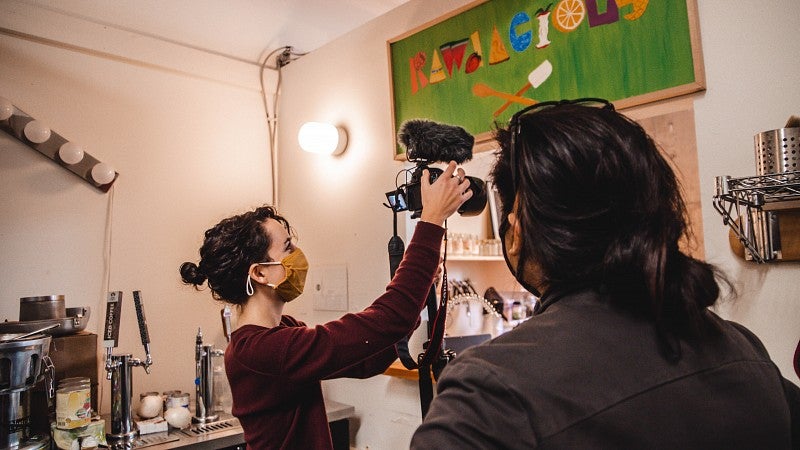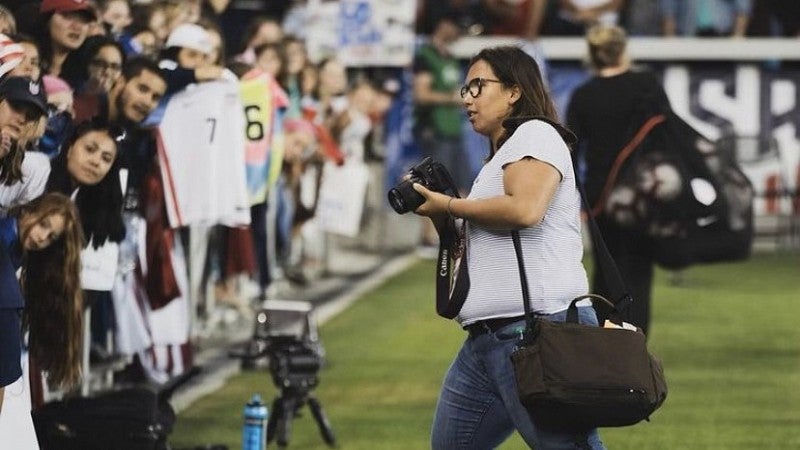
(Credit: Stacy Yurishcheva '22, strategic communication master's student)
Time management is a crucial factor in professional and academic success — especially when you’re striving for both at once.
The strategic communication and multimedia journalism master’s programs at the University of Oregon School of Journalism and Communication Portland are designed for mid-career professionals, with evening and weekend classes that fit neatly around a typical work schedule.
This is an attractive option for students, but it also raises the question: What does it really look like to attend graduate school full-time and have a full-time job or multiple jobs?
SOJC Portland grad students Terrellyn Moffett, Alli Weseman, Maeve Connor and Brint Ingersoll are all balancing graduate school, work and life. Having recently completed their first term, these hardworking students provided perspectives on time management, self-advocacy and self-care.

Balancing on-site filming assignments, three jobs and full-time graduate school is all part of a day’s work for Terrellyn Moffett. Multimedia journalism master’s students Monica Salazar and Pierce Singgih capture footage for Salazar's "story without words" project. (Photo courtesy: Terrellyn Moffett)
"I had huge concerns about time management [as an incoming student],” said Maeve Connor, a strategic communication master's student who works full-time as a marketing manager. “If I pulled an all-nighter in my 30s, I would die.”
Outlining objectives for each week and day in her planner helps her stay on track. Connor, who is working from home during the pandemic, streamlines her schedule to maximize time spent on school and work and finds ways to reduce time spent cooking and completing chores, including a meal kit subscription. Connor also prioritizes what she knows will help her focus, like having a tidy home office.
Having clear boundaries about time is another key to success. For example, Connor strives to avoid exceeding 40 hours of work a week. Clear communication and careful planning make that possible for her, but she acknowledges her situation is unique.
“I'm lucky that my workplace has a culture of working 40 hours a week. I have worked places where I could not have gone to grad school because the expectation was to work late into the night all the time,” Connor said. “You have to figure out whether your job is compatible with [school] or figure out how to place boundaries around work so that you can make them compatible.”
Terrellyn Moffett, a multimedia journalism master's student working three jobs, including a retail position in Salem, takes Wednesdays off from school and work. Moffett’s employers support her schoolwork and factor in her long commute when creating staff schedules, reflecting a conscious decision she made upon entering graduate school. “I made sure to find jobs that respected me,” Moffett said.
In addition to balancing their professional lives, students developed strategies for managing the high volume of school assignments.
Alli Weseman, a multimedia journalism master's student who works two jobs and freelances for various publications including Portland Monthly Magazine, is strategic about her project topics. She selects stories that are suitable for multiple class assignments and will enhance her professional goals. To make this happen, she maintains open lines of communication with her project partners and professors. Weseman is also honest with her advisor about her stress levels during her first term; her candor allowed them to adjust her schedule for the next term.
“If I have to take [fewer classes] and go through the program more slowly, then I’ll do it, because at the end of the day I need to take care of myself,” Weseman said. “I can't burn out so early in my career.”

Alli Weseman, a multimedia journalism master’s student who works two jobs in addition to freelancing for Portland Monthly Magazine, is strategic about her projects. She selects stories that are suitable for multiple class assignments and that will enhance her professional goals. (Photo courtesy: Alli Weseman)
Moffett also advocates for maintaining open lines of communication and shares openly about her struggles with anxiety and depression, both to advocate for herself and to empower other people with mental health challenges.
“This is a program that supports you,” Moffett said. “Talk to professors. Be as transparent as you're comfortable being.”
Brint Ingersoll, a strategic communication student who works over 30 hours a week as an independent consultant and a baker at Cathedral Coffee in Portland, uses a screen-reader app, Voice Dream, for his assignments. He finds it helpful for managing ADHD as a student. Ingersoll incorporated the screen reader into his busy schedule by listening to course materials while at work and driving.
For him, maintaining a balance between work, school and life includes making plenty of time for family. Ingersoll is married to another strategic communication master's student, Megan Ingersoll. The couple supports one another through busy weeks and shares stress-reducing activities like horseback riding. Brint Ingersoll also shares custody of three children from a previous relationship and strives to “make the most of our time together.”
Another key factor in balancing work, school and life is self-care.
“It's really easy to get focused on urgent things, like the assignment due tomorrow or the email that came in today,” Ingersoll said. “You still have to carve out time for the important things that aren't emergencies yet, including self-care."
Students have found creative ways to incorporate relaxation into their lives. For instance, Moffett finds renewal in outdoor recreation and photography, and Connor reads for school in the bathtub. Pacing oneself ensures that creativity can keep flowing for the long term.
“As creatives, [after] taking time off to actually sleep and eat some proper food, you come back with a fresh mindset and better ideas than what you were working with before,” Weseman said. “Inspiration is key, so your best work will shine.”
With several strategies to balance work and life with their studies, these hardworking students find graduate school challenges worth the effort.
“It’s so much fun,” Ingersoll said. “It can be intimidating to take on extra stuff … but there’s so much opportunity in the classes and extracurriculars that are offered. These are experiences we can't get again."
— Jenni Denekas, class of '22
Jenni Denekas, class of '22, is a strategic communication master's student and the communications and events assistant at SOJC Portland.
